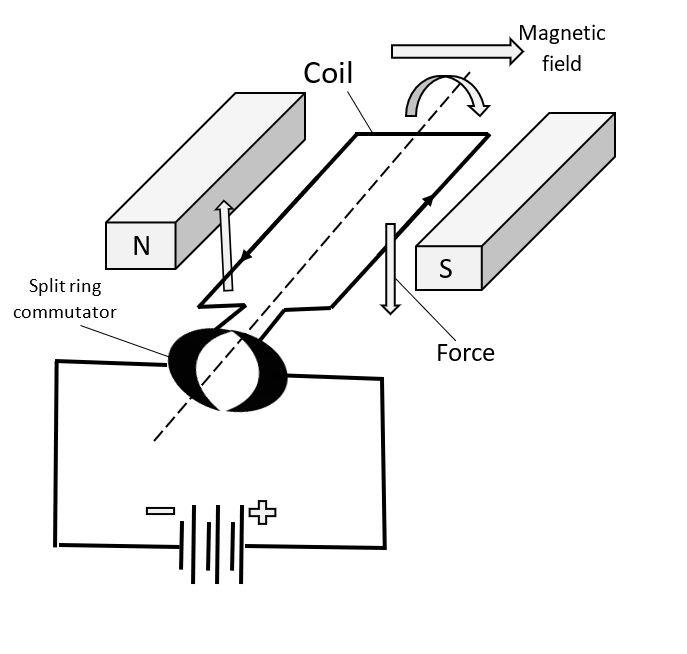
What is the principle of electric motors?
Answer
530.9k+ views
Hint: As the name suggests, an electric motor runs through electricity flowing through a wire, which creates a magnetic field and that magnetic field induces emf in the motor due to which a current starts to flow and the motor shaft starts to rotate.
Complete step by step solution:
An electrical machine through which we can convert electrical energy into mechanical energy is called an electric motor. A force is generated due to the interaction between the magnetic field of the motor and the current flowing through a wire winding. This force acts as a torque on the motor shaft and makes it rotate.

The functioning of an electric motor is primarily based on Ampere’s law, that a force will act on a conductor having a current flowing through it and has been placed in a magnetic field. If we bend a conductor into a frame and place it in a magnetic field such that the two sides of the frame at right angles to the magnetic field will experience a force F directed opposite to each other. Thus, these forces will generate a moment of force or torque due to which the frame will start to rotate. To provide greater constant torque, the armature of the motor has several turns.
The generation of magnetic fields can be done by both magnets or electromagnets. The electromagnets are generally composed of a wire wound over a core. And thus, according to Faraday's law of induction, a current in the windings of the electromagnet will be induced by the current flowing through the frames which will then generate a magnetic field.
Hence, an electric motor works on the principle which states that when a rectangular coil is placed in a magnetic field with current passing through it, a torque is generated on the coil making it rotate.
Note: Contrary to an electric motor, a generator converts mechanical energy to electrical energy and in motors also, a back emf is generated due to the magnetic field inside the coil and it acts against the applied voltage.
Complete step by step solution:
An electrical machine through which we can convert electrical energy into mechanical energy is called an electric motor. A force is generated due to the interaction between the magnetic field of the motor and the current flowing through a wire winding. This force acts as a torque on the motor shaft and makes it rotate.

The functioning of an electric motor is primarily based on Ampere’s law, that a force will act on a conductor having a current flowing through it and has been placed in a magnetic field. If we bend a conductor into a frame and place it in a magnetic field such that the two sides of the frame at right angles to the magnetic field will experience a force F directed opposite to each other. Thus, these forces will generate a moment of force or torque due to which the frame will start to rotate. To provide greater constant torque, the armature of the motor has several turns.
The generation of magnetic fields can be done by both magnets or electromagnets. The electromagnets are generally composed of a wire wound over a core. And thus, according to Faraday's law of induction, a current in the windings of the electromagnet will be induced by the current flowing through the frames which will then generate a magnetic field.
Hence, an electric motor works on the principle which states that when a rectangular coil is placed in a magnetic field with current passing through it, a torque is generated on the coil making it rotate.
Note: Contrary to an electric motor, a generator converts mechanical energy to electrical energy and in motors also, a back emf is generated due to the magnetic field inside the coil and it acts against the applied voltage.
Recently Updated Pages
Master Class 10 Computer Science: Engaging Questions & Answers for Success

Master Class 10 General Knowledge: Engaging Questions & Answers for Success

Master Class 10 English: Engaging Questions & Answers for Success

Master Class 10 Social Science: Engaging Questions & Answers for Success

Master Class 10 Maths: Engaging Questions & Answers for Success

Master Class 10 Science: Engaging Questions & Answers for Success

Trending doubts
What is the median of the first 10 natural numbers class 10 maths CBSE

Which women's tennis player has 24 Grand Slam singles titles?

Who is the Brand Ambassador of Incredible India?

Why is there a time difference of about 5 hours between class 10 social science CBSE

Write a letter to the principal requesting him to grant class 10 english CBSE

A moving boat is observed from the top of a 150 m high class 10 maths CBSE




